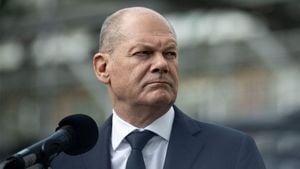Israel and Hezbollah have once again found themselves at loggerheads, with both sides accusing each other of violating the terms of their recent ceasefire agreement. This temporary truce, which came about after more than 14 months of intense conflict, is showing signs of instability, raising questions about its future sustainability.
The situation escalated on Wednesday when Israeli forces fired on southern Lebanon, injuring two individuals. The Israel Defense Forces (IDF) justified their actions, claiming they were responding to unauthorized movement observed near the border. An online post from the IDF indicated, "The IDF identified a vehicle with several suspects in a zone prohibited for movement... IDF troops fired to prevent them from advancing, and the suspects left the area." This statement highlights the tense situation, where even minor skirmishes can spark broader hostilities.
Hezbollah was quick to retort. Hassan Fadlallah, a prominent lawmaker from the group, asserted the IDF was targeting civilians attempting to return to their villages, claiming this action breached the ceasefire agreement. Such allegations indicate the delicate balance both sides must maintain to prevent the conflict from reigniting.
This 60-day ceasefire, brokered by the United States, is intended to halt the fighting between the two factions, which escalated after Hamas attacked Israel on October 7, 2023. The agreement stipulates both parties withdrawing their forces from vulnerable positions along the Lebanon-Israel border. Meanwhile, Lebanese security forces have been tasked with the important job of ensuring Hezbollah does not re-establish military operations in southern Lebanon.
President Joe Biden welcomed the ceasefire, calling it "good news from the Middle East," and emphasizing the U.S.'s commitment to fostering peace not just between Israel and Hezbollah but also urging for pauses in the continuing conflict involving Hamas in Gaza. Yet, such political goodwill stands on shaky ground.
Fast forward to the present, and echoes of the past 18 years are haunting the situation. Foreign Editor David Pratt reflects on the tumultuous events from 2006 when another war devastated parts of Lebanon and Israel. Back then, Hezbollah proclaimed victory, claiming to have sent the IDF home “with a bloody nose.” Today, leaders from Hezbollah, including Naim Qassem, are making similar claims of triumph over Israeli forces, though the reality on the ground tells another story.
After the most recent conflict, Hezbollah has faced significant military losses, with Israel adeptly targeting and dismantling many of its command structures and assets. The group’s once-robust operational capabilities have been severely diminished. Deep intelligence penetrations have enabled Israel to assassinate key Hezbollah leaders, adding to the chaos within the organization's ranks.
Analysts suggest this loss of leadership may push Hezbollah's political wing, often overshadowed by its military leadership, to take more control. Nancy Ezzeddine, from the Clingendael Institute, warns of potential internal conflicts within Hezbollah as it attempts to adapt to this new organizational reality. The group's ability to maintain unity will be tested as tensions within Lebanese society grow.
Interestingly, the Lebanese populace appears to be losing faith in Hezbollah’s narrative of victory. Imad Salamey, a political expert, remarks, "Hezbollah’s claim of victory holds little weight outside its core constituency." The war has not been popular among the broader Lebanese community, primarily concerned with the substantial economic toll the conflict has created.
Indeed, the impact on civilian life has been catastrophic. With nearly 4,000 lives lost and 16,000 more injured, the humanitarian crisis deepens. Tens of thousands of homes have been damaged or destroyed, leading to the displacement of over 1.2 million people across the country. The World Bank estimates the financial fallout at around $8.5 billion, more than one-third of Lebanon's GDP.
And yet, there are uncertainties surrounding the funding for reconstruction. While Hezbollah claims it will gather the necessary resources for rebuilding, their primary supporter, Iran, is grappling with economic challenges of its own. Questions linger about the group's capacity to satisfy its constituents amid widespread destruction and dire humanitarian needs.
Turning to Israel’s perspective, towns like Haifa are still reeling from the aftershocks of the conflict. The emotional trauma lingers, with residents caught between the desire to return to normal life and the remnants of their fears. For many, the real challenge is not merely recovering from physical destruction but healing from the emotional scars left by living through such violence.
With schools still not fully operational and many families still adjusting to life under the shadow of fear, how can daily life resume? Parents worry about their children’s ability to cope with returning to classrooms amid the uncertainty. The specter of violence lingers, affecting daily routines and community dynamics.
The emotional toll is significant, with the scars of conflict often invisible yet deeply felt. Victims of the past want reassurance – the freedom to live without the constant anxiety of sudden conflict. Resilience becomes more than just a word; it symbolizes hope for the people grappling with their new reality.
Photographs of families celebrating statements of “victory” starkly juxtapose the devastation they face, with so many houses reduced to rubble. The northern regions of Israel and southern Lebanon now find themselves intertwined, both desperate for peace but haunted by memories of violence.
What lies next for Israel and Hezbollah as they navigate this fragile ceasefire? The path forward requires cautious diplomacy and a true commitment to the cessation of hostilities. The international community’s role will be pivotal, ensuring both parties adhere to the terms of the agreement and address the urgent humanitarian crises each side faces.
While hopes for lasting peace linger, tensions simmer just beneath the surface. Each side maintains its narratives – of victory and resilience – but history teaches them to tread carefully. The ghost of past conflicts looms large, reminding everyone involved of the steep price of war, one repeated time and again.



